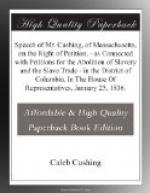[The question, Shall this petition be received? was then, at the motion of a gentleman from South Carolina, (Mr. Hammond) laid on the table; when Mr. Cushing resumed the floor and said:]
I now present to the House a Petition signed by inhabitants of Amesbury, in the State of Massachusetts, among the subscribers to which are persons whom I know and avouch to be citizens of the United States. They pray for the abolition of slavery and the slave trade in the District of Columbia, and in the Territories under the jurisdiction of the United States. I make the preliminary motion that it be received; and, upon that motion, I proceed to express my views to the House.
Steering clear of all the inflammable matter intruded into these debates, gauging myself to the standard of the most absolute moderation, and resolutely tying down my thoughts to the real point in issue, what I propose to examine is the single naked question of the constitutional right of petition, as involved in the disposition of these petitions.
Looking into the Constitution I find, among the amendments proposed by the Congress of 1789, and the very first of the number, the following article:
“Congress shall make no law respecting an establishment of religion, or prohibiting the free exercise thereof, or abridging the freedom of speech or of the press; or the right of the People peaceably to assemble and to petition the Government for a redress of grievances.”
Long before I had imagined that such a right would ever be called in question, I remember to have read the remark of a distinguished jurist and magistrate of the State of Virginia, (Tucker’s Notes on Blackstone,) complaining that the concluding words of the clause I have cited from the Constitution did not so strongly guard the great right of petition, as the liberties of the People demanded. On the other hand, a still more distinguished jurist and magistrate, of my own State, (Story’s Commentaries,) in remarking upon the same article, expresses the opinion that it is ample in terms; because, he adds, “It (the right of petition) results from the very nature of the structure and institutions of a republican government; it is impossible that it should be practically denied until the spirit of liberty had wholly disappeared, and the People had become so servile and debased as




